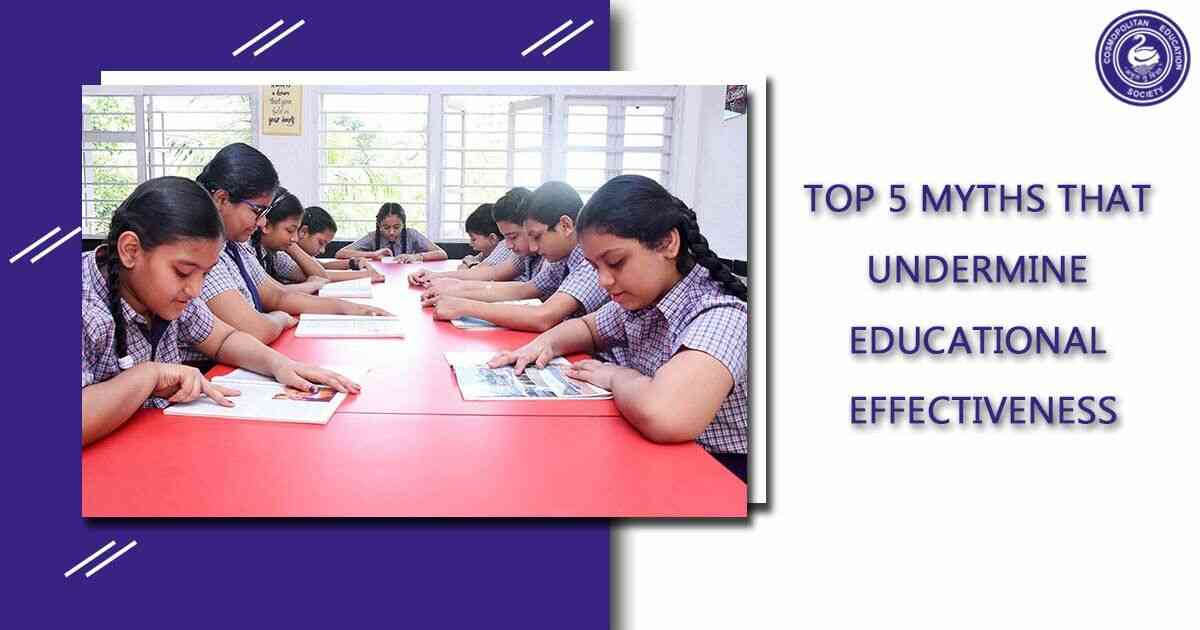Top 5 Myths That Undermine Educational Effectiveness
- - Category: Childhood Education
- - 17 Feb, 2022
- - Views: 658
- Save

he top 5 myths undermining educational effectiveness explained in brief for better understanding.
In the past years, education researchers have done enough to turn around commonly held beliefs in regards to educational effectiveness. Certain educational practices are still used in today’s upgraded education world. The below-mentioned myths are shared in an attempt to contradict certain widespread educational scientific practices which no longer hold substantial value.
The top 5 myths undermining educational effectiveness explained in brief for better understanding.
Myth 1: Speed is Synonymous With Intelligence
You will not deny that you can’t rush something you want to last forever. Not just relatable to the field of education but also stands true in daily life activities.
Learning tends to turn stressful once its playfulness and passion is lost. This is exactly when students begin to operate in an auto-pilot environment in a classroom i.e. artificial speed. A very common misconception to clarify here is that students are not alone in this race: their teachers operate at an even more relentless pace. Teachers fuel this belief when they rush to portion covering speed before the year-end.
This mythical rapid speed of covering critical topics or skills not only causes significant stress in both teachers and students but also creates rigidity in their minds where there is no scope of dialogue learning. In the desire to be more speedy with portion covering, teachers have null or too little time for doubt solving making learning ineffective. Additionally, students who are quick learners become models for the rest of their peers in class. These smart kids provide relief and a sense of satisfaction to the teacher that her teaching pace is not too overwhelming.
Key takeaway: Speed is not synonymous with intelligence.
Myth 2: Subject matter Knowledge is a Teacher’s Most Powerful Asset.
Let’s try and answer this question: What makes a good teacher? You would probably say, knowing the subject to teach well. Your absolutely right, but teaching is obviously not just about the transfer of knowledge, is it?. This isn’t a new concept, but we continue to ignore it’s a part of the teacher preparation program across the world.
According to well-known education researchers: “Talking, Telling, Showing Powerpoints, Putting students online or Showing films doesn’t make you a good teacher”. Teachers need to know how to start a lesson, motivate, act on information from formative assessments, design tests and evaluate performance. There are too many skills put together which makes an effective teacher and these skills are quite different from content knowledge alone.
Key takeaway: The best teachers will have to know their content. But if that is their only asset, they will fail as teachers and fail the country.
Myth 3: Curriculum Size Does Not Matter.
Did you know, With reasonable curriculums to cover, teachers believe they are able to contribute more significantly to their students’ learning, and research backs up that claim?
As teachers attempt to engage their class students individually, teachers also need time to understand the needs of their students. The only hindrance to understanding the needs of the students in class is the strength of the class. Similarly, curricula that include critical thinking, discussion, debate, and group projects cannot be rushed into.
Key takeaway: Large curriculum size will hinder our production of citizens suited for the modern world.
Myth 4: Homework Boosts Achievement.
Cooper, an experienced researcher on the relationship between homework and student achievement, has concluded that homework completion aids test performance because teachers often create tests using material that is similar to homework material. But the positive correlation ends here. Most studies lack solid evidence that homework boosts achievement; in fact, in some cases, it reverses performance.
Key takeaway: It’s the motivation and drive of the individual students that produce the effects we see, not the homework.
Myth 5: You Can Always Just Look It Up.
We have heard this statement too many times as students, “You can look it up on the internet”. Internet is definitely a boon for today’s modern educational methods of teaching and learning. But think for yourself, a query in science you have can be answered but knowing the open discussion forums there could be 2 answers to the same question. Is it the ultimate spot for learning for a student? The answer is No. Along with classroom teaching, a teacher can probably explain the theory and give relevant reading material which is then online.
Key takeaway: Google and Wikipedia can be your referral points, not your textbook.
Summing up:
At Shri. Harshad C. Valia International School, Mumbai we believe in John Dewey’s words of wisdom – “Education is not preparation for life, Education is life itself.” Living up to the 2021 education trends we strive to churn out not only educated individuals but also learned human beings.

